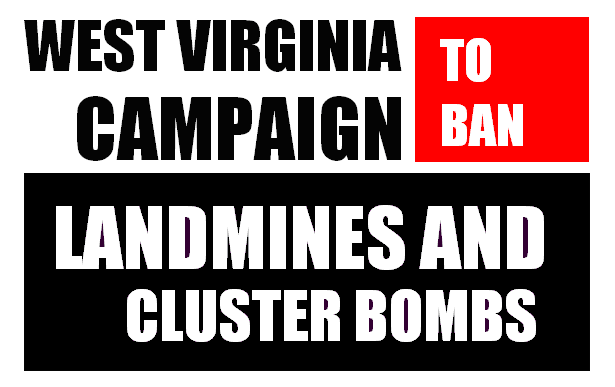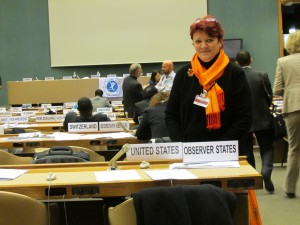“Making a World of Difference” Art and Photo Exhibit by PSALM: PROUD STUDENTS AGAINST LANDMINES and CLUSTER BOMBS/WVCBL: West Virginia Campaign to Ban Landmines and Cluster Bombs opened on January 10th, 2014 at the Monongalia Arts Center in Morgantown, West Virginia.
“Making a World of Difference” acknowledges and honors individuals and organizations that have made a substantial difference in people’s lives around the globe through their humanitarian efforts to rid the world of landmines and cluster munitions. “Making a World of Difference” is also a challenge to be inspired by the real heroes in our society who are achieving remarkable things for others, not just in remote corners of the world but in our own communities too.
 The International Campaign to Ban Landmines (ICBL) is a global network in some 100 countries that works for a world free of antipersonnel landmines, where landmine survivors can lead fulfilling lives. The Campaign was awarded the Nobel Peace Prize in recognition of its efforts to bring about the 1997 Mine Ban Treaty. Since then, we have been advocating for the words of the treaty to become a reality, demonstrating on a daily basis that civil society has the power to change the world.
The International Campaign to Ban Landmines (ICBL) is a global network in some 100 countries that works for a world free of antipersonnel landmines, where landmine survivors can lead fulfilling lives. The Campaign was awarded the Nobel Peace Prize in recognition of its efforts to bring about the 1997 Mine Ban Treaty. Since then, we have been advocating for the words of the treaty to become a reality, demonstrating on a daily basis that civil society has the power to change the world.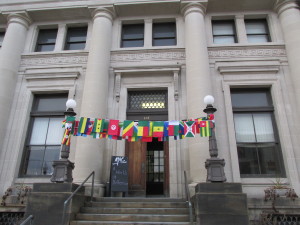
PSALM students acted as gallery guides and gave presentations to visitors. A special homage to Nelson Mandela was also displayed with information about the upcoming THIRD REVIEW CONFERENCE TO THE MINE BAN TEATY in Maputo, Mozambique in June.
Nelson Mandela and his widow Graca Machel played important roles largely behind the scenes in helping to create the Mine Ban Treaty back in 1997.
As president of South Africa, Mandela oversaw the government’s change in position announced 20 February 1997 to support a comprehensive ban on antipersonnel landmines. That announcement came just days before the International Campaign to Ban Landmines (ICBL) held its 4th international NGO conference in Maputo, Mozambique. In Maputo, Graca Machel’s foundation hosted the campaign and its then-coordinator Liz Bernstein in the months leading up to the 1997 NGO meeting in Mozambique. South Africa went on to host a key meeting in May 1997 at Kempton Park that helped build Africa-wide support for the goal of a total ban on antipersonnel mines. In December 1997, Mandela sent South Africa’s then-deputy President Thabo Mbeki to sign the Mine Ban Treaty in Ottawa. Under Mandela’s presidency, South Africa ratified the Mine Ban Treaty on 26 June 1998, the 21 nation to do so and fifth from Africa. Prior to the adoption of the Mine Ban Treaty, South Africa–a former landmine producer and user–destroyed its considerable stockpile of more than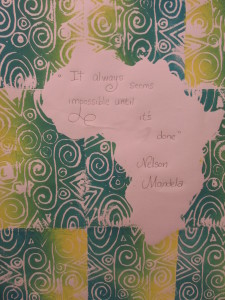 300,000 antipersonnel landmines.
300,000 antipersonnel landmines.
A significant number were destroyed in one go on 21 May 1997 in what is believed to be the first stockpile destruction event to include media and NGO participation.During the preparatory meeting for the Mine Ban Treaty’s 3rd Review Conference in Geneva, Mozambique opened with a minute’s silence in his memory. South Africa made a brief statement acknowledging all the messages received and noting that “we shared him with the world.” We honor his legacy and spirit in our activism in support of the Mine Ban Treaty’s implementation and universalization.

Included in MAKING A DIFFERENCE ART SHOW:“The Good Bomb Sculpture Project” By PSALM students What is the opposite of a bomb that wreaks havoc, pain and destruction? When the question was posed to PSALM students, they responded with a variety of answers. Something that would deliver peace, joy, happiness to all made the grade. But so did: food for the hungry, shelter for the homeless, clean viable drinking water for those in need, care for the sick, schools for children, safe land for living to name a few. These sculptures by PSALM students represent, through vibrant colors and interesting shapes and designs, imagined “systems” that would deliver all things needed for a more just and peaceful world. That is why PSALM students are so passionate about eradicating landmines and cluster bombs. These weapons infringe on so many areas of life. They are the “war after the war”. Whether it is the loss of life or the immediate medical needs of the survivors, the inability to farm land for food and retrieve water, or the environmental affects of aged weapons that have been seeping into the ground. Our work is necessary because it is not enough to want peace, love and happiness. One must work to rid the world of what stands in the way of others achieving a more just and peaceful life. Bombs have delivery systems. If we are talking about good bombs the delivery systems may be us. We want to minister to the needs of the most vulnerable of our society. But it is not enough to simply deliver what is needed to ensure that hunger is staved or thirst is quenched or that civilians are protected from the instruments of war and violence. We must look at the systems in place that contribute to these pressing issues of our time and look at ways we can change them for the better.

“P.S.A.L.M.” (Proud Students Against Land Mines and Cluster Bombs are working members of the West Virginia, United States, International Campaign to Ban Landmines and the Cluster Munition Coalition. Students are encouraged to dream of a more just and peaceful world and to make that world a reality. The students use their skills and talents to not only learn about these important issues, but to facilitate change for a better world. They are empowered to truly make a difference! These students donate their time, talent and energy because they care about children and want to work for a more just and peaceful world. In 2014 we celebrate our 15th year working for a mine free world. The human costs of landmines are staggering. Children lose their limbs. Parents lose their children. Refugees lose their homes or farms. Soldiers lose their lives. All of us lose because human life is precious. One third of all recorded cluster munitions casualties are children. 60% of cluster bomb casualties are injured while undertaking their normal activities. Civilians account for 85 percent of casualties of landmines.
****************************************************
The Thirteenth Meeting of States Parties to the Mine Ban Treaty, Geneva, Switzerland DECEMBER 2013
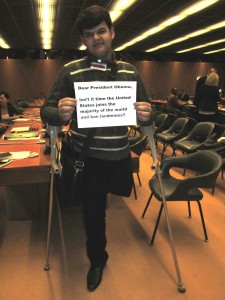 Record achievements in landmine clearance and a steep decline in documented casualties last year highlighted the Thirteenth Meeting of States Parties to the Mine Ban Treaty which ended on December 6th, 2013. “The record low in casualties together with an all-time high in clearance of contaminated areas – including in heavily affected countries like Afghanistan, Cambodia and Colombia – shows that we are closing the gap toward a mine-free world. However, the first ever confirmed use of landmines by a State Party – Yemen – shows the need for even greater vigilance to eradicate mine use forever,” said Kasia Derlicka-Rosenbauer, ICBL director. The ICBL’s Landmine Monitor recorded 3,628 casualties in 2012, a nearly 20 percent decrease from 2011 and almost 60 percent decrease from 1999. This is the lowest level since the Mine Ban Treaty entered into force. 2012 also marked a high point for landmine clearance by States Parties; a total of 280 square kilometers of mined areas were released last year according to the Monitor report. Three countries announced completion of their clearance obligations (Bhutan, Hungary and Venezuela), while Germany announced that no antipersonnel mines were found in an area previously suspected of contamination. Some 30 countries have now completed their clearance obligations under the Treaty. During the Meeting of States Parties, Yemen acknowledged mine use by government forces in 2011. This is the first confirmed use of antipersonnel mines by a Treaty member and cause for serious concern and response by States Parties. Yemen’s acknowledgement of the violation and commitment to conducting a thorough investigation is significant. Ongoing allegations of mine use in recent years, including possibly by government forces in States Parties Sudan and South Sudan, are very disturbing. Neither government has yet taken significant steps to address these concerns. State Party Turkey is still in the process of dealing with alleged antipersonnel mine use by government forces in 2009. “How States Parties handle these most serious breaches and alleged breaches of the treaty will be a clear test of the Mine Ban Treaty’s strength and credibility,” said ICBL Director Kasia Derlicka-Rosenbauer. “Reports of new mine use by states not party – both Myanmar and Syria used antipersonnel mines this and last year – and by the territory of Nagorno-Karabakh in 2013 deserves special attention from Treaty members,” Derlicka-Rosenbauer added. Landmine Monitor documented use by non-state armed groups in as many as eight countries in its just released 2013 report.
Record achievements in landmine clearance and a steep decline in documented casualties last year highlighted the Thirteenth Meeting of States Parties to the Mine Ban Treaty which ended on December 6th, 2013. “The record low in casualties together with an all-time high in clearance of contaminated areas – including in heavily affected countries like Afghanistan, Cambodia and Colombia – shows that we are closing the gap toward a mine-free world. However, the first ever confirmed use of landmines by a State Party – Yemen – shows the need for even greater vigilance to eradicate mine use forever,” said Kasia Derlicka-Rosenbauer, ICBL director. The ICBL’s Landmine Monitor recorded 3,628 casualties in 2012, a nearly 20 percent decrease from 2011 and almost 60 percent decrease from 1999. This is the lowest level since the Mine Ban Treaty entered into force. 2012 also marked a high point for landmine clearance by States Parties; a total of 280 square kilometers of mined areas were released last year according to the Monitor report. Three countries announced completion of their clearance obligations (Bhutan, Hungary and Venezuela), while Germany announced that no antipersonnel mines were found in an area previously suspected of contamination. Some 30 countries have now completed their clearance obligations under the Treaty. During the Meeting of States Parties, Yemen acknowledged mine use by government forces in 2011. This is the first confirmed use of antipersonnel mines by a Treaty member and cause for serious concern and response by States Parties. Yemen’s acknowledgement of the violation and commitment to conducting a thorough investigation is significant. Ongoing allegations of mine use in recent years, including possibly by government forces in States Parties Sudan and South Sudan, are very disturbing. Neither government has yet taken significant steps to address these concerns. State Party Turkey is still in the process of dealing with alleged antipersonnel mine use by government forces in 2009. “How States Parties handle these most serious breaches and alleged breaches of the treaty will be a clear test of the Mine Ban Treaty’s strength and credibility,” said ICBL Director Kasia Derlicka-Rosenbauer. “Reports of new mine use by states not party – both Myanmar and Syria used antipersonnel mines this and last year – and by the territory of Nagorno-Karabakh in 2013 deserves special attention from Treaty members,” Derlicka-Rosenbauer added. Landmine Monitor documented use by non-state armed groups in as many as eight countries in its just released 2013 report.
A long anticipated announcement by the United States on whether to join the Treaty, was not forthcoming. “We are disappointed a decision has not been made for the U.S. to move forward on the Mine Ban Treaty.
We feel there has been ample opportunity to study the issue and see no reason not to join the majority of world and ban landmines” says WVCBL representative, Nora Sheets who attended the meeting. The 15-year decline in new landmine casualties illustrates the success of the Mine Ban Treaty in reducing casualties and suffering caused by these weapons. However challenges remain. Nearly 80% of casualties reported in 2012 were civilians, with the proportion of children and women increasing. States must ensure adequate funding for victim assistance programming as well as upholding the rights of survivors in remote areas. The Mine Ban Treaty’s Third Review Conference (3RC), which will take place from 23 to 27 June in 2014 in Maputo, Mozambique, will mark a critical point in the Treaty’s history. Coming fifteen years after the First Meeting of States Parties was held there, the conference will assess the progress made to date and provide a roadmap for completion of Treaty obligations. The ICBL presented States with a “Completion Challenge,” urging governments to commit at the Review Conference in Maputo to complete their specific Treaty obligations within an ambitious, defined time frame. ICBL believes the remaining work under the Treaty could be finished within ten years after the Third Review Conference. Concretely, ICBL calls on states to do the following as soon as possible and not later than 10 years from the Review Conference:
•Destroy all stockpiles of antipersonnel mines;
•Clear contaminated land in the most effective and efficient way;
•Ensure sustainable and accessible victim assistance and protecting the rights of landmine victims, including through broad frameworks such as those for development or disability;
•Provide and use resources and support needed to finish the remaining work in the most effective and efficient manner, including through strategic and focused “completion partnerships” between affected and donor states and other partners;
•Ensure universal respect for the ban norm to eradicate use of antipersonnel mines by any actors anywhere, including use by non-state armed groups, with states still outside the treaty joining as soon as possible.
Over 100 governments and a majority of all States Parties to the Mine Ban Treaty, participated in the 13MSP, which closes today. Representation from a wide range of States not Parties to the MBT and newly established national campaigns in Iran, Libya, Myanmar demonstrated the strength of the global norm banning antipersonnel landmine use, on the 16th anniversary of the Treaty signing.
For more information contact:
Jared Bloch, Media & Communications Manager, Tel: +41 786 83 4407, Email: [email protected].
ICBL on Flickr: http://www.flickr.com/photos/minefreeworld/sets/72157632872471810/
ICBL Facebook: http://www.facebook.com/minefreeworld
ICBL Twitter: https://twitter.com/minefreeworld
Landmine Monitor2013: http://www.the-monitor.org/index.php
